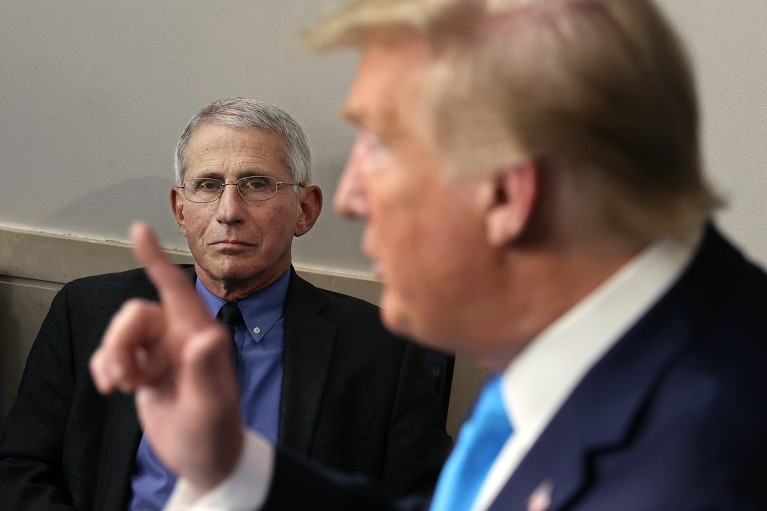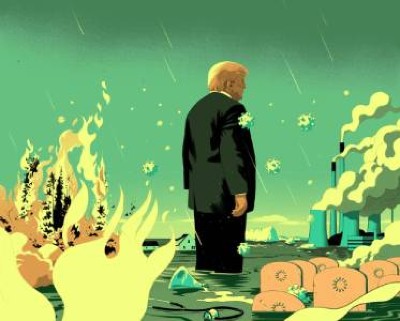
Former health official Anthony Fauci (left) had a strained relationship with then-president Donald Trump throughout the COVID-19 pandemic.Credit: Chip Somodevilla/Getty
Earlier this month, the union representing thousands of scientists and engineers at the US Environmental Protection Agency (EPA) signed a new contract that includes protections for government workers who stand up for scientific integrity. A similar provision was included in a union contract at the US Department of Agriculture last year, and negotiators for the union representing more than 5,000 early-career scientists at the National Institutes of Health are following suit. A contract could be signed in the next several months.
These collective bargaining agreements are the latest front in an ongoing effort to shield US science agencies from political interference. The administration of US President Joe Biden, who this week bowed out of the race for November’s presidential election, has already crafted legal protections for government scientists and other workers. It is now rushing to finalize scientific-integrity policies at dozens of federal agencies.
How Trump damaged science — and why it could take decades to recover
Political meddling in science has long been a bipartisan affair, but the current movement is fuelled by fears that former president Donald Trump will regain the office. Trump’s first term as president proved disastrous for scientists at the EPA and other science agencies, and many fear that a second term would be even worse.
If Trump wins November’s election, the next question is what will happen with the US Congress. If Republicans were to retain control over the House of Representatives and seize control of the Senate, Trump would have at least two years of free rein to reshape the government to his liking.
“People should not be confident that we have the legal tools to effectively respond to abuses of power in a second Trump administration,” says Blake Emerson, an administrative-law researcher at the University of California, Los Angeles.
Scientific integrity
Biden kicked off efforts to protect science and scientists during his first week in the White House, by issuing a memorandum calling for new and stronger scientific-integrity policies across the federal government. The administration is planning to formally announce the completion of a suite of policies next month, covering as many as 20 federal agencies.
Government watchdogs have raised alarms about repeated delays, but administration officials say they expect to publish new or updated policies for nearly all of the 30 federal agencies covered by the White House initiative by the end of September. “It’s a complex process, and it takes time,” says Francesca Grifo, who leads the scientific-integrity office at the EPA in Washington DC and co-chairs a White House panel that is heading the process.
Grifo says the policies — as well as the panel, made up of scientific-integrity officials from across the government — will establish political and institutional norms in case a future administration tries to break or revoke the rules. The current administration is also planning to conduct workshops over the coming months to help federal officials to understand and implement the new rules. In the absence of a federal law establishing formal legal standards, however, many fear that it will be difficult to prevent a hostile administration from meddling with science or retaliating against researchers who speak out.
“We could have the next presidential administration take a red pen and destroy all of this,” says Anita Desikan, a senior analyst at the Center for Science and Democracy at the Union of Concerned Scientists, an advocacy group in Cambridge, Massachusetts.
Civil service
The Biden administration has also finalized legal protections for scientists and other federal workers who are hired competitively into the civil service, as opposed to high-level officials who are appointed by the president. The move comes in direct response to an executive order issued at the end of Trump’s previous tenure in the White House that would have made it easier to reclassify the jobs of tens of thousands of career professionals, including scientists — and then to fire them.
Exclusive: the Trump administration demoted this climate scientist — now she wants reform
Biden quickly revoked that order after taking office, but many expect a second Trump administration to move quickly to transform the civil service. Trump’s vice-presidential nominee, J.D. Vance, said in 2021 that Trump should, if re-elected, fire “every civil servant in the administrative state”, and “replace them with our people”.
In April, the Biden administration finalized a rule designed to prevent exactly that by limiting which federal workers can be reclassified under a provision known as schedule F. That would make it harder to reorganize the civil service, says Emerson, but there would be nothing to stop a second Trump administration reversing course with a new rule.
The end result would be a system in which people are appointed to influential positions because of their allegiance to a particular political belief of party, “and that just breeds corruption”, says Tim Whitehouse, executive director of Public Employees for Environmental Responsibility, an advocacy group in Silver Spring, Maryland.
Unions for science
The collective bargaining agreements negotiated by unions are a new route for protecting government science and scientists. Workers at the EPA learnt their lesson during the first Trump administration, which imposed a contract with fewer protections for federal workers, says Nicole Cantello, who is based in Chicago, Illinois, and serves as legislative and political coordinator for the union that represents more than half of the EPA’s 15,000-plus workforce.
In negotiating its contract with the Biden administration, the union secured a clause on scientific integrity for the first time. As it now stands, any disputes about scientific integrity or alleged retaliation against scientists who speak out would be heard by an independent arbiter outside the agency. And if a potential Trump administration tried to repeal the contract, Cantello says, the union would have legal recourse to challenge that decision, too.
“We really were not prepared to defend the agency the first time around,” Cantello says, calling the Trump administration’s dismissal of science and scientists radical and unprecedented. “People don’t want to experience that again and are gearing up to fight.”


